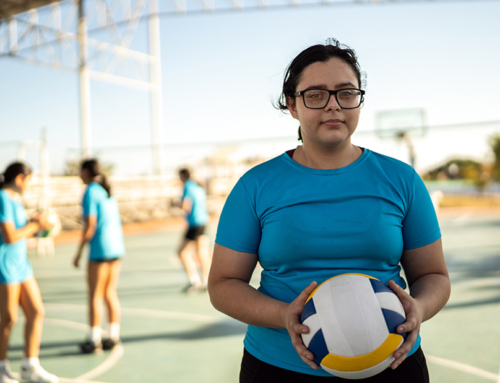So, you’ve found yourself in charge of a youth soccer team.
First, congratulations! You have the opportunity to grow the sport and make a positive impact on many young lives. Now, you may be worrying you’re under-qualified for the role. However, following some overarching principles during your time with the team will help guarantee an enjoyable, beneficial experience for everyone.
As a youth soccer coach, one of your major responsibilities will be organizing and running practices. That may sound like an overwhelming endeavor, but designing an effective youth soccer practice isn’t rocket science. In fact, simplicity should be one of your guiding principles during this process. If you overcomplicate things, the kids won have fun, and neither will you. With that in mind, here are five tips for running an effective youth soccer practice.
1. Always bring a positive attitude
This one is all on you, Coach. It’s your job to bring life and energy to practice. If you bring a bad attitude or negative energy to the field, the kids will notice, and it will affect the enjoyment they get out of practice. When the kids aren’t having fun, they won’t give full effort. This is the recipe for bad, unproductive practices. Leave your outside life out at home and focus on using the short time you have with your athletes to make a positive impact in their lives. Do that and you’ll find you frequently leave the field happier than you arrived.
2. Don’t expect to find the next Pelé
The last thing that should be on your mind during practice is identifying a member of your team as the next great soccer superstar. Every child you coach matters just as much as the next. No one makes the national team as a 7-year-old, and different kids progress at different paces. If you truly want to help your players grow and develop, you’ll give equal amounts of attention and instruction to each of them. This period of a player’s athletic career is about fun. If you start putting extreme expectations and pressure on a talented kid, they can quickly lose their love of the sport. And if you ignore that kid whose skills aren’t quite on the level of their teammates, you risk making them feel ostracized and unwanted. In both cases, the result is a kid who’s likely to quit soccer before they reach their teens. Your job is to foster a love for the game and the lessons it can teach in our youth—not to be a talent scout.
3. Keep it simple; Let them play
Youth coaches often try to come up with fancy drills to make themselves feel like a developmental genius. Truth be told, you do not need complex drills and expensive equipment to run a successful youth soccer practice. All you need is a group of happy kids and a ball.
“Coaches can often be more helpful to a young player’s development by organizing less, saying less and allowing the players to do more. Set up a game and let the kids play. Keep most of your comments for before and after practice and during water breaks,” reads the U.S. Soccer pamphlet Best Practices for Coaching Soccer in the United States. “Kids need to be allowed to play freely, develop their skills and use them in a creative manner.”
Get comfortable with holding practices that look like pick-up games. You can adjust the size of the field and the number of players per side to change the focus in these games, but simply allowing the kids to play and organically learn what does and does not work for them can be hugely beneficial.
When you do implement drills, try to make them simple enough that they can be coached with one or two key points. The simpler the drill is, the quicker the kids will be able to grasp the concept, making them more confident and aggressive. Youth players don’t need to learn how to curve in a free kick or play a 60-yard driven pass. Teach them how to make efficient passes and shoot the ball on frame. Teach them how to trap the ball and get comfortable with basic dribbling. Teach them how to stay in front of an attacker and time a tackle. Help them learn how to keep their basic position throughout the game. Teach them what it means to “clear” the ball and when using that tactic might make sense. Giving these young players a good foundation of skill and knowledge will help them experience more success today and position them for greater development down the line.
4. Playing time matters, the score does not
This may be the most important thing to remember when coaching youth sports. This is a time for these kids to learn the sport, develop their skills, and build relationships. It’s not the time for you to focus on building your coaching resume by doing whatever it takes to win games and tournaments. Don’t utilize your youth soccer team to feed your ego or fulfill your glory days. Allow each player to play a similar amount of minutes and experience different positions. Never tell a player no when they want to play a new position or try something new. Foster creativity and allow your players to play with a sense of freedom. No one has fun if they’re playing in constant fear of getting yelled at.
5. Communicate with both kids and parents
This one is going to save you a lot of headaches. You don’t need to just communicate with the kids and their parents, you need to over-communicate with them. Keep the messages short and effective, but re-iterate them time and time again. Let them know what time practice is, what time they should arrive, when you’ll be done, everything they’ll need for games and practices, etc. Be proactive with your communication and you hopefully won’t find yourself needing to explain things multiple times (though if you should, remain patient and professional).
From day one, communicate your goals for the season and the plan you have to achieve those goals to both kids and parents. Let them know that your top priority is keeping things fun and engaging for the kids. When you make your mission known from the outset, it makes conversations down the line a lot more simple. If you find that a parent is ruining the experience for the team (such as screaming from the sideline for the entirety of a game or practice), you need to take it on your shoulders to speak with them and address how their actions are hindering the goals of the team.
Be professional and caring with the parents, they’re trusting their kids with you!
These five tips can go a long way toward helping you run an effective youth soccer practice. Additionally, here’s a checklist you can use for each practice/game to make sure you’re prepared:
- A couple extra water bottles
- Soccer balls
- Cones for drills
- A list of player names and parent names
- Whistle
- Different colored jerseys/pinnies to separate teams
- Positive attitude and patience!
Here’s a checklist you can provide the kids/parents, so they know what to bring:
- Water
- Shin Guards
- Cleats
- Athletic Clothing
You don’t need fancy training apparatus to train youth soccer players. Regarding time commitment, how long should your practices be? Youth athletes should not be exhausted when they leave practice. They’re there to have fun, and they have plenty of time to build “mental toughness” via conditioning drills later in life. Keep the practices to no longer than one hour. The first 5-10 minutes can consist of a dynamic warm-up, the next 20-25 minutes can consist of simple drills, and the remainder of practice can consist of scrimmaging and small-sided games.
The more time kids spend standing around during practice, the less beneficial the session will be. Try to organize the session so the kids stay involved and engaged as much as possible! Simply breaking them up into smaller groups and having each group perform a drill as opposed to having the entire team wait around for one kid at a time to complete a drill is a great method for this.
When it comes to the specific drills you’ll want to implement, we have plenty of suggestions:
- Improve Your Ball-Handling With These 2 Simple Drills
- 4 Soccers Drills You Can Do Anywhere
- Every Youth Soccer Coach Should Steal This Drill From the U.S. Women’s National Team
- 5 Drills to Improve Your Soccer Dribbling
The most important thing to take away is let kids be kids and have fun! At this age, it doesn’t matter how many games they win. Should you teach them to play to win? Of course. But focus more on their development and demeanor than the outcomes of the games. They’ve got their entire lives to take things more seriously. Focus more on teaching the children the sport and making it enjoyable for them. If they don’t enjoy it, they won’t stick around.
Original Article Posted On Stack.com



